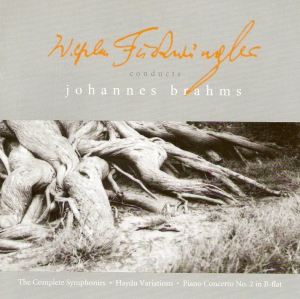 |
 |
|


alternatively
CD: MDT
AmazonUK
AmazonUS |
Johannes BRAHMS
(1833-1897)
Symphony No. 1 in C Op.68 (1868) [47:10]
Symphony No. 1 in C Op.68 (1868) - finale [16:57]
Symphony No. 2 in D Op.73 (1869) [38:20]
Symphony No. 3 in F Op.90 (1883) [41:22]
Symphony No. 4 in E Op.98 (1885) [39:54]
Variations on a theme by Haydn Op.56a (1873) [19:51]#
& [20:49] *
Piano Concerto No.2 in B flat Op.83 [47:10]
 Edwin Fischer (piano)
Edwin Fischer (piano)
Berlin Philharmonic Orchestra (1 - finale, 3, 4, Haydn#, concerto)
North German Radio Orchestra (1, Concerto, Haydn*) Vienna Philharmonic
Orchestra (2)/Wilhelm Furtwängler,
rec. 8 November 1942, Berlin (concerto) 12-15 December 1943, Berlin
(4, Haydn#) 28 January 1945, Vienna (2) 27 October 1951, Hamburg
(Concerto, Haydn*) 23 January 1945, Berlin (1 - finale) 27 April
1954, Berlin (3)
 MUSIC & ARTS CD-4941 [4 CDs: 64:27 + 75:20 + 60:00 +
68:05]
MUSIC & ARTS CD-4941 [4 CDs: 64:27 + 75:20 + 60:00 +
68:05] 
|
|
|
I think it’s sensible for Music & Arts to revisit
and reissue its Brahms-Furtwängler restorations. The bulk
dates from 1996, whilst the final disc was originally released
in 1999. Restorations are by Maggi Payne. The four discs are
priced as for three. The notes derive from John Ardoin’s
The Furtwängler Record (Amadeus Press, 1994) and
have largely influenced the selection, which is predicated on
the most convincing surviving performance. In most circumstances
that would mean the surviving wartime broadcasts but there is
no complete wartime First, and no wartime Third at all. So,
augmented as this set is with two separate Haydn variations
performances, and the 1942 Edwin Fischer Brahms Second Concerto,
we have a powerful box that will make renewed claims on the
collector.
The First Symphony was actually recorded in the studio in 1942
(or 1944, no one seems sure) but that performance has had a
strange afterlife; it made it to a Japanese LP but has had restricted
currency. The single surviving movement from Berlin in January
1945 is however included as an appendix, as it were, to the
North German Radio performance of 1951. The Berlin finale indicates
what we have missed - it’s amazingly powerful. But the
1951 inscription is notably granitic and purposeful, its tread
inexorable from the opening paragraph, the slow movement flooded
with an aristocratic plangency, the finale - whilst not as determined
as the Berlin - still notably fine. The Second Symphony (Vienna,
January 1945) represents his last wartime concert in the city.
Tempi are unexceptional; not unlike the tempi Stokowski took,
in fact. There are the expected chair squeaks and some other
noises off not least from the audience, but this performance,
given so soon after that titanic Berlin First, carries over
to Vienna something of the same sense of engagement and barely
suppressed energy in the finale, and affectingly moulded slow
movement. Though there is a later Berlin performance, in addition
to the well known studio London Philharmonic Decca traversal,
this is the Furtwängler No. 2 to have.
He was not the first - and nor will he be the last - to have
had trouble charting the Third’s topography. The dangers
of a generic expressive response are evident from this Berlin
performance of April 1954, given not long before his death.
There are two other surviving documents, one from Berlin in
1949 and the other with his orchestra on tour in Turin in May
1954. Once again Music & Arts has gone with Ardoin’s
selection of the April 1954 reading as the best survivor. He
played it less often than the other symphonies, and its sense
of weightiness - physical, spiritual - is allied to too free
a sense of metrical flexibility. The Fourth, by contrast, is
another story wholly. The December 1943 performance is the first
to survive and demonstrates all the moist vivid, driving qualities
to be expected of his wartime inscriptions. It is full too of
expressive gestures, full of heightening devices, but ones that
never derail the mighty symphonic argument that the conductor
is elucidating.
The well-known Fischer performances has a few gruff moments
and dropped notes but it too is wartime and thus very passionate,
The two Haydn variations comes from wartime Berlin - the same
sessions that gave us the Fourth - and from the same Hamburg
concert that gave us the First Symphony.
In newly restored form, this box represents the best of Furtwängler’s
Brahms.
Jonathan Woolf
|
|




 All Nimbus reviews
All Nimbus reviews








